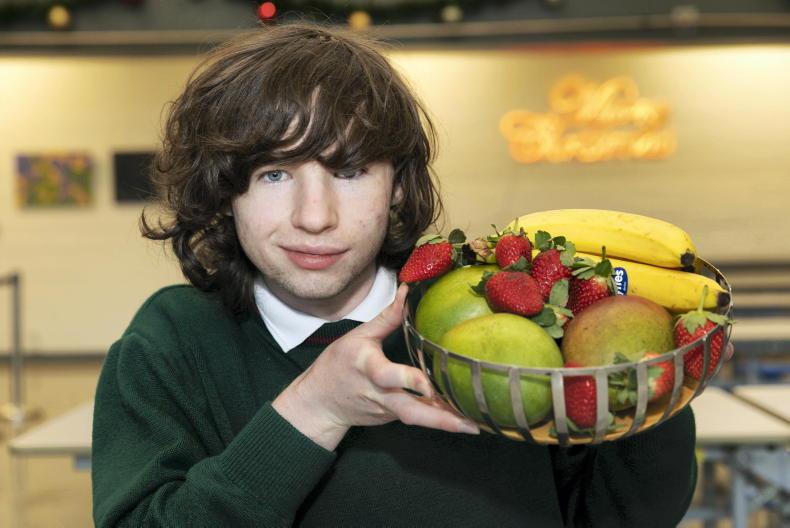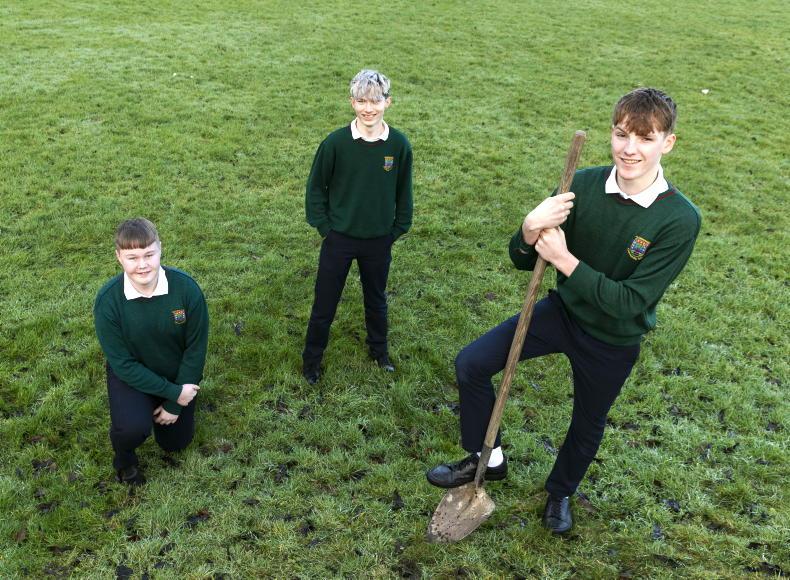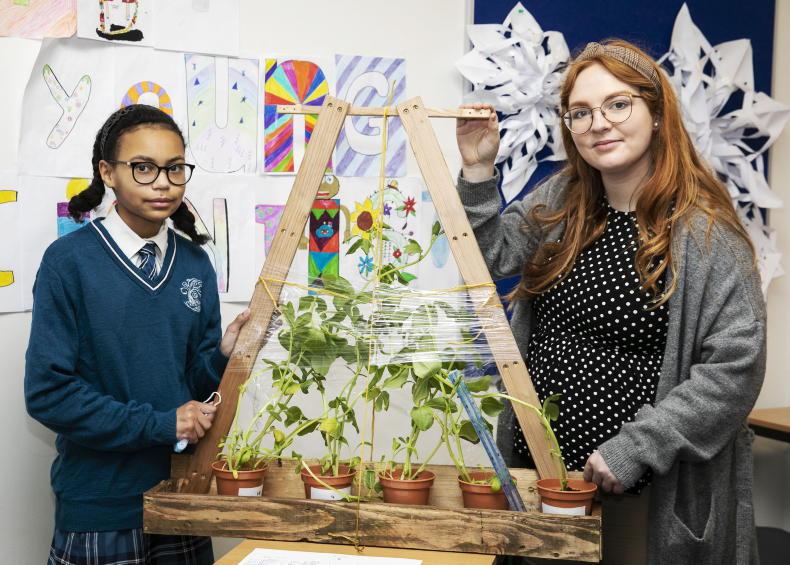Although this year’s event could not go ahead in the traditional manner, the array of talent at the 2021 Virtual BT Young Scientist and Technological Exhibition has proven just as impressive as ever.
Eco-friendly bale netting’
Fifth-year students Fergal Keane, Ciaran Bonfil and Fionn Doherty from St Joseph’s Community College, Co Clare, aimed high with their project, creating a biodegradable and edible alternative to plastic bale netting.
The students, who all hail from farming backgrounds, were inspired to take up the challenge as they knew too well the problems surrounding traditional plastic net on farms.
They described the risk of livestock ingesting the plastic, the labour involved in handling the plastic twine and the environmental impacts of plastic and its disposal.
Through a series of processes, such as crushing, extracting and spinning a hemp stalk, the students transformed the hemp plant’s fibres into a product with similar properties to traditional plastic bale twine.
Strong fibres
The boys said: “We chose hemp as our material for a number of reasons. Hemp is well suited to Irish soil and weather conditions, the stalk contains very strong fibres and it can grow up to seven feet tall, which suited our needs perfectly.”
Acutely aware of the role that farmers play in climate change action, the trio ensured all angles of the project were eco-proofed.
“Our net is edible, cows are able to digest it and so it is much less labour-intensive, saving the farmer time on handling and disposal. It is also biodegradable, so it will eventually break down. Overall, it is much friendlier to the environment.
Local
“All the processes regarding fibre extraction and preparation were completely environmentally friendly. We sourced the hemp locally, which aligned with our vision to keep everything in our project local.
“As we all know, climate change is one of the biggest crises in our world today. We wanted to contribute to the saving of our planet by eradicating one of the main causes of pollution on farms. And we enjoyed every minute of this project.”
While the next goal is to move their product from a prototype to the market, the team have future hopes to open their own agri-based company, with a focus on rectifying environmental issues.
SOS - Save Our Sheep tracking system
Unfortunately, livestock theft remains at the forefront of farmers’ concerns, with over 1,000 cattle reported as missing or stolen in 2020.
Billy Corrigan and John Fox from Presentation College, Wicklow, put their heads together in attempt to decrease these numbers in the future. Their project involved developing a GPS tracker for use on sheep and cows to help prevent farm theft.
The team showed a video of a farmer indoors with his flock, scanning their individual ear tags using his smartphone, with a specific application already installed, before taking them outdoors. This application holds the tag information of each scanned animal.
Next, the farmer moves his flock outdoors. Checking and counting the flock, the farmer then exits the field through a secure gateway, ensuring the gate is locked.

Billy Corrigan and John Fox of the SOS (Save Our Sheep) tracking team.
Viewers were then shown a device, discretely sitting on the access gate of the field. This device is connected to the animal’s ear tags and the smartphone app.
As demonstrated on the video, a perpetrator breaks the entryway and attempts to move the flock out the gap. However, the tracker device on the gate picks up the lamb’s tags as they pass it and send an immediate alert to the owner’s mobile phone.
Before the flock is loaded into the thief’s trailer, the owner has contacted the authorities and the theft is interrupted.
Compostable and biodegradable ration bags?
Abigail Kelleher and Sinead Creedon from St Mary’s Secondary School, Co Cork, took on a detailed farm sustainability experiment.
With farming roots and a shared concern for the environment, the girls investigated the qualities of both biodegradable and compostable ration bags.
To test biodegradability, the students submerged both bags in equal amounts of bovine manure for a two-month period.
They also examined the practical suitability of each bag, testing them for weather resistance and strength.
Durable
They found that although neither bag fully decomposed in the time frame allowed, the compostable bag is both weather proof and durable.
Having carried out their investigation, Abigail and Sinead were confident that with further research and development, a sustainable ration bag will be developed in the near future.

Conor Doherty from Bailieborough Community School, Cavan. Conor conducted an investigation to determine if porous fruit absorbs pesticides and chemicals.

The Bailieborough Community School group of Aran O'Hanlon, Tadhg Barry and Mark Monaghan. This team looked at whether sheltered areas near hedges and under trees contain the same amount of nutrients as the rest of the field.
Read more
Student Diary: ag science project next to be ticked off the list
A career in science, the agri-industry – or both?
Although this year’s event could not go ahead in the traditional manner, the array of talent at the 2021 Virtual BT Young Scientist and Technological Exhibition has proven just as impressive as ever.
Eco-friendly bale netting’
Fifth-year students Fergal Keane, Ciaran Bonfil and Fionn Doherty from St Joseph’s Community College, Co Clare, aimed high with their project, creating a biodegradable and edible alternative to plastic bale netting.
The students, who all hail from farming backgrounds, were inspired to take up the challenge as they knew too well the problems surrounding traditional plastic net on farms.
They described the risk of livestock ingesting the plastic, the labour involved in handling the plastic twine and the environmental impacts of plastic and its disposal.
Through a series of processes, such as crushing, extracting and spinning a hemp stalk, the students transformed the hemp plant’s fibres into a product with similar properties to traditional plastic bale twine.
Strong fibres
The boys said: “We chose hemp as our material for a number of reasons. Hemp is well suited to Irish soil and weather conditions, the stalk contains very strong fibres and it can grow up to seven feet tall, which suited our needs perfectly.”
Acutely aware of the role that farmers play in climate change action, the trio ensured all angles of the project were eco-proofed.
“Our net is edible, cows are able to digest it and so it is much less labour-intensive, saving the farmer time on handling and disposal. It is also biodegradable, so it will eventually break down. Overall, it is much friendlier to the environment.
Local
“All the processes regarding fibre extraction and preparation were completely environmentally friendly. We sourced the hemp locally, which aligned with our vision to keep everything in our project local.
“As we all know, climate change is one of the biggest crises in our world today. We wanted to contribute to the saving of our planet by eradicating one of the main causes of pollution on farms. And we enjoyed every minute of this project.”
While the next goal is to move their product from a prototype to the market, the team have future hopes to open their own agri-based company, with a focus on rectifying environmental issues.
SOS - Save Our Sheep tracking system
Unfortunately, livestock theft remains at the forefront of farmers’ concerns, with over 1,000 cattle reported as missing or stolen in 2020.
Billy Corrigan and John Fox from Presentation College, Wicklow, put their heads together in attempt to decrease these numbers in the future. Their project involved developing a GPS tracker for use on sheep and cows to help prevent farm theft.
The team showed a video of a farmer indoors with his flock, scanning their individual ear tags using his smartphone, with a specific application already installed, before taking them outdoors. This application holds the tag information of each scanned animal.
Next, the farmer moves his flock outdoors. Checking and counting the flock, the farmer then exits the field through a secure gateway, ensuring the gate is locked.

Billy Corrigan and John Fox of the SOS (Save Our Sheep) tracking team.
Viewers were then shown a device, discretely sitting on the access gate of the field. This device is connected to the animal’s ear tags and the smartphone app.
As demonstrated on the video, a perpetrator breaks the entryway and attempts to move the flock out the gap. However, the tracker device on the gate picks up the lamb’s tags as they pass it and send an immediate alert to the owner’s mobile phone.
Before the flock is loaded into the thief’s trailer, the owner has contacted the authorities and the theft is interrupted.
Compostable and biodegradable ration bags?
Abigail Kelleher and Sinead Creedon from St Mary’s Secondary School, Co Cork, took on a detailed farm sustainability experiment.
With farming roots and a shared concern for the environment, the girls investigated the qualities of both biodegradable and compostable ration bags.
To test biodegradability, the students submerged both bags in equal amounts of bovine manure for a two-month period.
They also examined the practical suitability of each bag, testing them for weather resistance and strength.
Durable
They found that although neither bag fully decomposed in the time frame allowed, the compostable bag is both weather proof and durable.
Having carried out their investigation, Abigail and Sinead were confident that with further research and development, a sustainable ration bag will be developed in the near future.

Conor Doherty from Bailieborough Community School, Cavan. Conor conducted an investigation to determine if porous fruit absorbs pesticides and chemicals.

The Bailieborough Community School group of Aran O'Hanlon, Tadhg Barry and Mark Monaghan. This team looked at whether sheltered areas near hedges and under trees contain the same amount of nutrients as the rest of the field.
Read more
Student Diary: ag science project next to be ticked off the list
A career in science, the agri-industry – or both?









 This is a subscriber-only article
This is a subscriber-only article










SHARING OPTIONS: